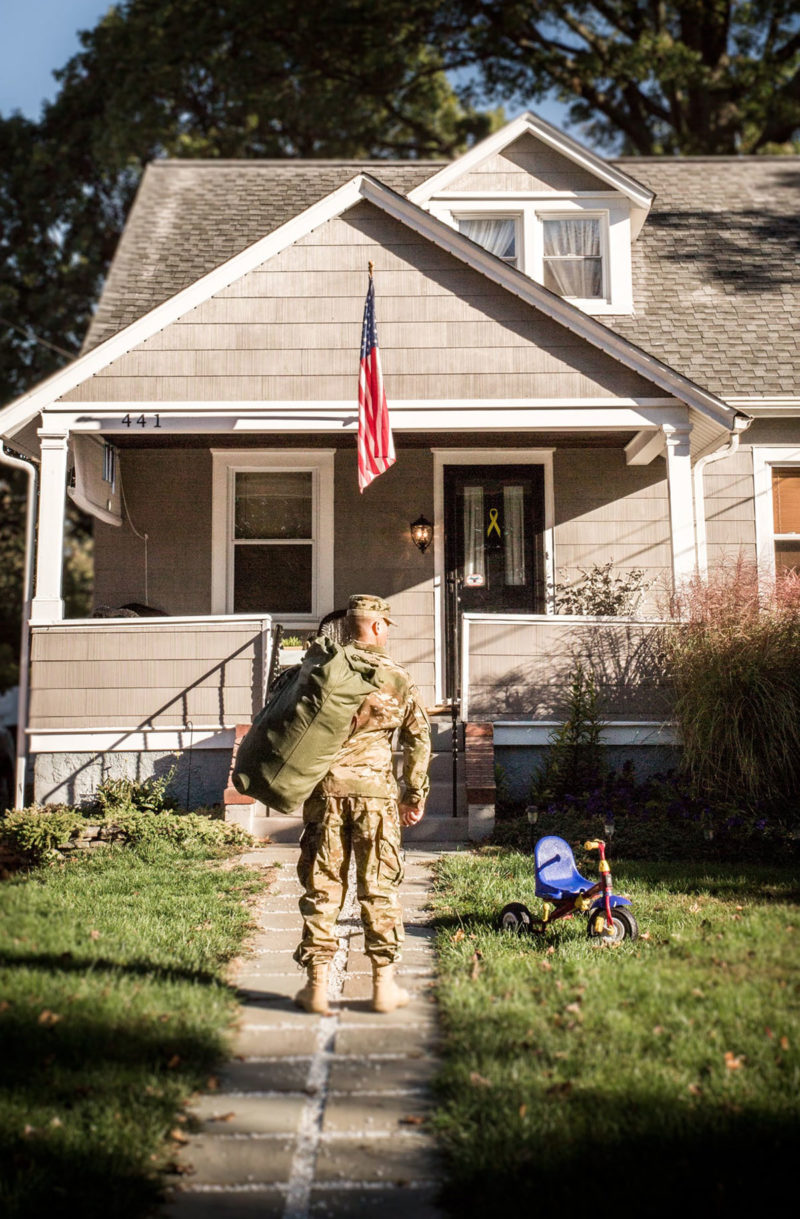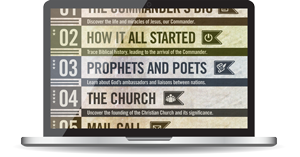God’s Presence Helps Me Wait
Week Summary
What blessings can we discover while waiting on God?
Even the most powerful Biblical leaders, like Moses and David, doubted their ability in times of waiting. Week one explores how deployment feels and where we can find hope through the Book of Exodus. By following in Moses’ footsteps, we can transform doubts into maturity and confidence, and walk with courage in the comfort and confidence that God is with us at all times.
About This Journey
Deployment can leave those at home feeling like we’re alone in the wilderness. When we live in the presence of God, we are never on our own. In “Deployed Not Despondent”, we journey through Exodus to help us recognize God’s activity around us and to see deployment through a lens of blessing and gratitude.
This Week's Readings
Dear Deployment
Read
And [the LORD] said, “My presence will go with you, and I will give you rest.”
-Exodus 33:14Reflect
Dear Deployment,
While this is not your first visit to our family, fourteen months will certainly make it the longest. As we near our first month together, I want to share a few thoughts with you. As expected, you’ve come bearing “gifts”—loneliness, anxiety, fatigue, frustration, hectic schedules, sleepless nights, even a broken window and dishwasher. The thing is, my God has also offered some gifts of his own—reminders of his presence in the midst of the journey. After just one month, I can already see how he intends to use your stay to change our family, to teach us, to help us grow and mature in him.
I know the blessings of God’s gifts will far exceed the annoyances of yours. So, deployment, while I cannot say that I am happy you are here, and I certainly do not enjoy your company, you are welcome to stay. I know that we will have some difficult days together, and honestly, I hope that once you leave, I will never have to see you again.
More than anything, I choose to trust my God. I know when the appointed time comes for you to leave, my family and I will be able to say with certainty born of experience that God really does cause all things to work together for the good of those who love him and are called according to his purpose (Romans 8:28). We will declare we really can do all things through Christ who gives us strength (Philippians 4:13). Yes, we will see the glory of God through this and we will say, “Thank you!”
With regards,
Tracie
Air Force wife Tracie penned these words to a personified deployment. I read them and shook my head in wonder. What journey did this young woman take to get to the place where she could see deployment as good and describe it as a blessing?
Tracie would be the first person to tell you the blessing of deployment was hard-earned, born out of persevering through loneliness and fighting through fear. She would tell you she did this well on some days and not so well on other days. Most importantly, she would tell you that she did not get to the place of blessing alone. Tracie had the help of family, friends, and military agencies. Her key source of help was the presence of God, who walked with her during the time her husband was away.
The book of Exodus chronicles a type of deployment. Though different from the deployment you may face as a military wife, you can apply the biblical principles presented. The deployment described in Exodus was the first of this type for the Israelites. They were not sure what their journey would hold. No doubt they wondered if they would even continue to exist as a people. They had no resource guides or agencies to look to for assistance. They did not have friends who had walked the road before. This was a maiden voyage. They learned some valuable first-person lessons that can benefit those who are looking toward, or are in the midst of deployment.
Just like Tracie, the Israelites made it through deployment primarily with the presence and help of the Lord. That same help and presence of the Lord is available to you as you make your deployment journey.
Respond
What are words you would use to describe how you feel about deployment? Take a moment to write the words in a journal. Consider using the words as the basis of a prayer asking God to help you view deployment through a lens of blessing.
Prayer
Father, I look to you as my help and my hope. I ask you to help me view my circumstances through a lens of blessing and gratitude. Grow my faith as I daily trust you. Amen.
Burning Bush Orders
Read
And the angel of the Lord appeared to him in a flame of fire out of the midst of a bush. He looked, and behold, the bush was burning, yet it was not consumed. And Moses said, “I will turn aside to see this great sight, why the bush is not burned.” When the Lord saw that he turned aside to see, God called to him out of the bush, “Moses, Moses!” And he said, “Here I am.”
-Exodus 3:2-4“...Come, I will send you to Pharaoh that you may bring my people, the children of Israel, out of Egypt.”
-Exodus 3:10Reflect
Deployment begins long before military personnel depart from home base. Deployment begins with notification. Notification is that time when an official alert travels through the chain of command and the preparation to mobilize is set in motion. The word itself, let alone the act, can challenge the most organized, test the most patient, and discombobulate the most confident. The notice usually comes during an ordinary day, in the midst of mundane activity—and it gets our attention!
God sent deployment orders to Moses at just such a time. On an ordinary day, while shepherding a flock of sheep for his father-in-law, the Lord spoke to Moses from a burning bush. Say, what? You read it right—we are talking flames of fire from a burning, but not burned, bush!
In Scripture, fire is often a sign of God’s presence. There is no doubt fire and smoke draw attention. On this day, God certainly got Moses’ attention when he did not allow the fire to consume the wood. Such an unnatural event could not happen unless God made it happen. God demonstrated that he could make the ordinary into something extraordinary.
When Moses turned his attention to the burning bush, the voice of God instructed him to remove his shoes. Again, God made something ordinary become something extraordinary when a common plot of ground became a sanctuary.
God may not speak to you in a burning bush, but you can be sure he wants to get your attention. Are you open to hear God’s voice? As you face this deployment, look to God to demonstrate himself in your life in an extraordinary way. He wants to help turn ordinary times and places into sacred times and places that remind you he is present.
Respond
Think of a time when God got your attention. What were the circumstances? What made you aware of him? When has God transformed your ordinary day or place into something extraordinary?
Prayer
Father, as I go through an ordinary day, I pray for an awareness of your presence. Open my eyes to see you. Open my ears to hear you. Help me pay attention and respond to you today. Amen.
The Dreaded “D” Word
Read
But Moses said to God, “Who am I that I should go to Pharaoh and bring the children of Israel out of Egypt?”
-Exodus 3:11Reflect
The very word “Deployment” can strike fear into the heart of the bravest and most independent military spouse. Deployment can mean a call to guard a hostile border, battle militant terrorists, combat illegal drugs, and fight deadly disease. Any complaint or protest invites the response: “You should have known what you were getting into” or “Don’t be surprised, this is what you signed up for.” When deployment orders arrive, the last thing I want to hear is, “Put on your big-girl panties and deal with it.” Give me time. I will get there. (O Lord, please let me get there!)
Another dreaded D word that can accompany deployment is doubt. My personal deployment convoy included a line of doubts about my ability to navigate the terrain ahead.
Sister, you can take comfort in the fact that a number of biblical heroes started out struggling with doubt when their orders arrived. We remember Moses as a powerful leader who performed miraculous events with the anointing of God. When God gave him his deployment orders, however, Moses doubted his ability to accomplish the mission. The book of Psalms holds some deep expressions of doubt. David, one of Israel’s greatest and most courageous heroes, wrote many of the Psalms.
Consider these words of doubt from his hand:
How long must I take counsel in my soul and have sorrow in my heart all the day? How long shall my enemy be exalted over me? (Psalm 13:2)
I had said in my alarm, “I am cut off from your sight …” (Psalm 31:22)
O LORD, how many are my foes! Many are rising against me; many are saying of my soul, there is no salvation for him in God. (Psalm 3:1–2)
When you read the above Psalms in their entirety, you see that though David questioned God’s presence, he did it from the perspective of knowing this truth: God was present. Even though things around or within were not as they should be, God was with him. He took his doubts to the source of his hope. In his honesty, he found a deeper relationship with God. The psalms written by David do not end with doubt—they end with hope.
If you think about it, we always judge heroes for where they end up, not where they start. Doubts at the beginning of deployment do not have to end up as defeat at the end of deployment. Instead, God can transform such doubts into maturity and confidence.
Respond
What doubts might you have concerning the challenges ahead? Heroes such as Moses and David doubted. How do these examples encourage you? Read Psalm 13 and write in a journal what you learn about doubt and hope.
Prayer
Lord, in the midst of my doubts and fears, remind me of your steadfast love. I confess my doubts to you and ask you to strengthen my faith. Amen.
Power of Attorney
Read
God also said to Moses, “Say this to the people of Israel, ‘The Lord, the God of your fathers, the God of Abraham, the God of Isaac, and the God of Jacob, has sent me to you.’ This is my name forever, and thus I am to be remembered throughout all generations.
-Exodus 3:15Reflect
I watched my husband pack his rucksack before he deployed. The list was specific and the task was straightforward. The list included particular items of necessity—clothing, toiletries, and military equipment.
I like lists. A list can remove emotion and turn an unpleasant event into a task. Tasks have measureable outcomes. Tasks have points of completion.
A deployment checklist for a military spouse is not items to purchase but rather tasks to complete. Even then, it can read like a cut and dry list of to-do’s by which to place a big red checkmark. You can throw yourself into completing a task and not have to think about the purpose—just get ’er done!
Obtain power of attorney
Organize financial details
File automobile information
Update will
The most important item on my deployment checklist was probably the power of attorney. When my husband gave me a power of attorney, it gave me the authority to act in his name on his behalf.
In a way, God gave Moses a power of attorney to act on behalf of the Lord. Moses would take the name of the Lord with him when he told the Jewish leaders God’s plan to deliver them from bondage. Moses would show his power of attorney to Pharaoh in the form of supernatural acts when he acted on behalf of the Lord in telling Pharaoh, “Let my people go!” God’s name would be the credentials Moses needed to give him courage and comfort.
A power of attorney issued in the authority of her husband’s name can bring a sense of courage and comfort for legal matters to a deployed wife. Jesus wants you to have courage and comfort by using the credentials of the power of attorney he has given us in his Word, when he said, “Whatever you ask in my name, this I will do, that the Father may be glorified in the Son” (John 14:13).
Respond
What does it mean to you to see prayer as having a power of attorney? Read these verses and meditate on the power that is in the name of Jesus: Mark 16:17–18, Acts 3:6, Philippians 2:9–11.
When we pray in Jesus’ name, we pray with spiritual authority, inheritance and might. Jesus’ death on the cross, and subsequent resurrection, was a powerful sacrifice. It is our inheritance. Therefore, we boldly approach God because of Jesus’ gift. It is a gift that keeps on giving—through you and through me. My prayers are to reflect the character, nature, and purpose of Christ.
Prayer
Thank you, Jesus, for making it possible for me to come to you in prayer. Help me as I go through each day to make you a priority. I do not want to add time with you as just another item on my to-do list. It is a gift and a joy to spend time with you. I want to feel your presence. I depend on the strength you provide. Thank you for being present and accessible. Amen.
Plagued by Delays
Read
Then Moses turned to the Lord and said, “O Lord, why have you done evil to this people? Why did you ever send me? For since I came to Pharaoh to speak in your name, he has done evil to this people, and you have not delivered your people at all.”
-Exodus 5:22-23hen the Lord said to Moses, “Pharaoh’s heart is hardened; he refuses to let the people go.”
-Exodus 7:14Reflect
He is packed. There are red check marks indicating the completion of the preparation checklist. You have accepted that deployment is a reality, but he is still here. It seems like the deployment will never happen. If he has to go, then go already! The sooner he goes, the sooner he will return, right?
Welcome to the “hurry up and wait” syndrome that pokes fun at the military’s penchant to rush toward readiness only to sit for long periods before action. When it happens to you, it is not at all funny. The tendency seems like a paradox to what we characterize as a methodical and mechanized military.
The military helps drive home a true-life lesson: We cannot control time and what happens within the boundaries of time. Who can set the time when a storm may destroy a home? When a son or daughter falls in love? When an illness strikes? When a child takes a first step? We cannot control many things—good or bad. Yet we can have confidence that God is with us at all times.
When you are ready to get deployment started (so it can end!), it is hard to enjoy the wait. The Israelites certainly were not enjoying their wait, as the cruel bondage they experienced got worse. Scripture does not give a timeline for the events of Exodus, but we can surmise it took more than a few weeks from orders to exit. The timing was in God’s hands. He said go and it would happen, but it was not as simple as packing up one day and leaving the next. Even God’s presence did not guarantee instant results.
What did Moses do in his time of waiting? “Moses turned to the LORD …” (Exodus 5:22). In private, he took his discouragement to God. His words indicate he thought God’s promised deliverance would happen faster and with greater ease. You can hear the frustration and disappointment in his words: “and you have not delivered your people at all” (Exodus 5:23b). Moses needed the strength and courage such communion with God would provide. If you read ahead in Exodus 7, you see their exit would literally be plagued by delays.
The lesson on timing is an important one in the context of deployment—and life. Events do not always happen on our timetable. Plans change. Other considerations affect our schedule, and no matter how meticulously we plan, we cannot control time.
Respond
How does waiting cause you to doubt God’s faithfulness? What can you do to counteract doubt?
Prayer
Lord, give me patience to wait and trust in your timetable. Remind me of your Word: “Do not to be anxious about tomorrow, for tomorrow will be anxious for itself. Sufficient for the day is its own trouble” (Matthew 6:34). Amen.
Resources & Info
Resources to help you and other military wives in your community.
Are you enjoying these resources?
Sign up now to save your Journey progress and your favorite Segments.
Your download is being prepared.
- Small Group Resource: Deployed 1 - Leader's Guide
- Small Group Resource: Deployed 1 - Participant's Guide



